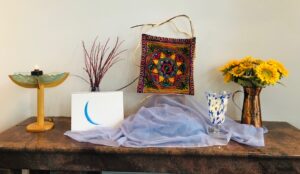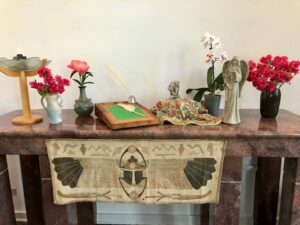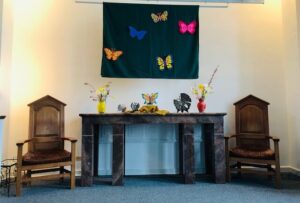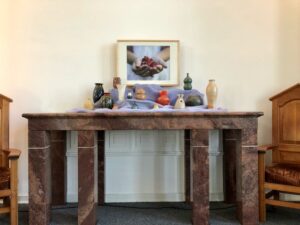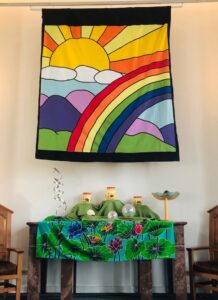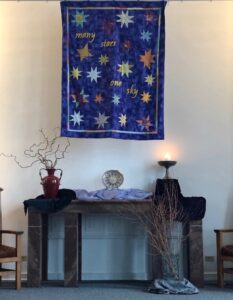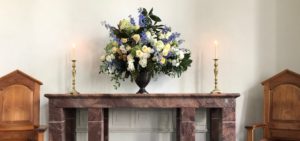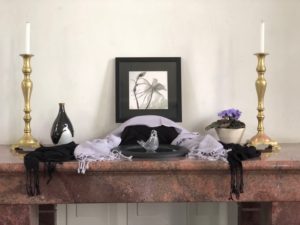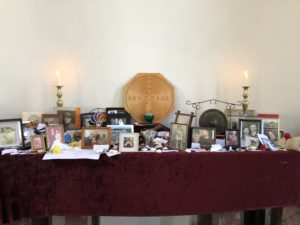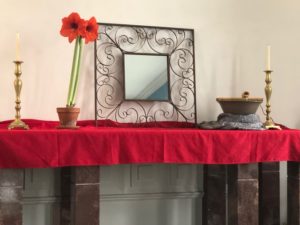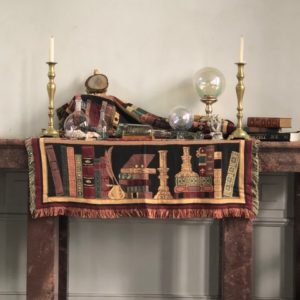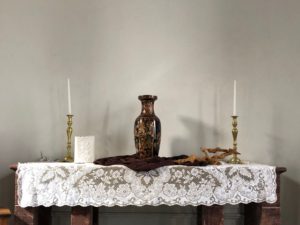Service led by Rev. Tim Temerson & Debby Norton (Worship Weaver)
As Unitarian Universalists, we affirm mystery and wonder as important sources of truth and meaning. Today we will explore the importance of uncertainty in Unitarian Universalism and ask if one can be “spiritual” or “religious” while, at the same time, saying “I don’t know” when it comes to the nature of ultimate reality.
The Spirituality of “I Don’t Know”
Rev. Tim Temerson
Some years ago, the Temerson family lived in a coastal community south of Boston, not too far from the historic city of Plymouth. While I enjoyed spending time at the area’s popular beaches, I often found myself wishing for a quiet spot on the water that was less crowded and noisy than the typical beach in summertime. And, eventually, I found just such a spot.
This particular place was located at the end of a quiet peninsula in the town of Duxbury and it overlooked a quiet bay. The town was founded by some of the Pilgrims who came over on the Mayflower and the spot on the coast where I liked to spend time originally belonged to Myles Standish, one of the leaders of the original Plymouth colony.
Although the Standish house is long gone, the piece of property where it stood has been protected from development and one can visit the site. There isn’t a whole to see on the land itself other than a couple of historical markers and a piece of the original stone foundation. But the coastline that the house overlooked is accessible and one can walk down to the water and enjoy the beauty of Duxbury Bay.
One of my favorite things about the Standish Homestead is that in spite of its historical significance, almost no one seemed to know about it. As I said before, it’s pretty tucked away and not easy to find. I remember going out there on many mornings and having the entire place to myself.
And during those moments of quiet overlooking that beautiful bay, I invariably experienced a feeling of quiet and calm, awe and wonder. I loved standing above the beach near the spot of the original house and looking out over the bay. I would simply watch and listen as the water gently lapped against the shore or as gulls flew by. It was so quiet, so peaceful, and so calm.
After spending time looking out over the bay, I would always make my way down to the water below. And what I site it is. For one thing, the tidal flows in Duxbury Bay are incredible. The beach grass is so green and gently sways with the sea breeze. And if the tide is out, you can walk far out into the bay and peer into little pools of water teaming with crabs, minnows, and all kinds of life.
I wish I could do justice to what I experienced in those moments. It was so beautiful, so calm, so alive and yet so quiet, and so very nourishing for my state of mind and being. All the worries and cares that I brought with me, from my latest to-do list to whatever problem or burden I might be struggling with – all of that would simply fade into the background.
And if there is one word that captures how I felt, it would have to be connected. The longer I gazed over the coastline or walked out into the Bay at low tide, the more I felt connected to all that I was seeing, hearing, and experiencing. The boundaries between myself and my surroundings just seemed to disappear. There was, in those moments, a oneness that I cannot explain or understand or even begin to accurately describe – a oneness that filled my heart with joy, with peace, and with a deep sense of belonging and being at home.
And as I sat or stood there experiencing that oneness and deep connection, questions would often come to mind, questions that reflected the beauty and peace of what I was experiencing. I would find myself wondering how and why this amazing place had been created. Was it simply a result of natural processes and evolution or was there some creative, artistic purpose or energy or spirit behind it? I also found myself wondering why beautiful places stir me in this way. Why did they always make me feel so connected, so at home, so part of all that I was seeing and experiencing? Was that deep connection merely a feeling or a product of my imagination or did it point to the existence of a deeper reality to which I belong – a reality that, as Mary Oliver says so well, is beyond knowing but that somehow keeps calling to me?
Clearly, in these wondrous moments, I was wrestling with ultimate questions – questions about the existence of God or gods, the nature of reality, and my overpowering feeling of being at home and one with all that I was experiencing. Those kinds of questions were so wonderful and are, in my view, at the heart of what it means to be human although I never seemed to be able to come up with definitive answers. Instead, I continued to wrestle with those big questions and always left that beautiful spot on the bay wondering if I would ever figure them out.
Now, if you had asked me to characterize those questions as well as my lack of definitive answers, I would have probably described them as being philosophical or perhaps nature-related. But one word I most certainly would not have used is “religious.” You see, I had always understood that “being religious” meant having answers not questions, faith, not uncertainty or doubt. Being religious, as I had defined it, meant believing in an all-powerful God who stands in judgment above us and who demands unquestioning faith in “his” existence.
If religion was about having answers and beliefs, it most certainly was not about asking questions like the ones I had while overlooking the bay. Asking questions, as I understood it, meant that one was lost, a religious failure in the eyes of God and the faithful, and that if you didn’t get your religious house in order, you would be judged and condemned to spend eternity in you know where.
What a contrast this conception of religion and of God was to what I experienced in beautiful places like the Standish Homestead. Walking along the beach and looking out over the bay, I experienced connection and beauty, not judgment and fear. And that connection and beauty led me to wonderful questions that invited me to go deeper rather than being forced into accepting a single truth and a single answer that excluded all my questions.
And it is that insistence on belief without questioning and truth without mystery that led me to stay away from anything resembling organized religion for much of my life. But then, one Sunday morning, my relationship with religion and my understanding of what it means to be religious was forever changed.
Not long after moving to our home not far from the Standish Homestead, my family and I began attending the Unitarian Universalist congregation in the town of Duxbury. I think it was our third or fourth Sunday when the minister of the church, Rev. Robbie Walsh, was preaching a sermon about the basics of Unitarian Universalism, a kind of UU 101. At one point during that sermon, Robbie said something that I will never forget and that proved to be my “A Ha” moment as a Unitarian Universalist. “In Unitarian Universalism,” Robbie said, the words “I don’t know” are very religious and deeply, deeply spiritual.
When Robbie uttered those words, I must have done a double-take because I couldn’t believe what I was hearing. Here was a minister, a religious leader, telling me that all of my questions all of my uncertainty in the face of the mysteries of life were not only acceptable, they were spiritual and religious! Robbie went on to say that having questions and being uncertain makes one a spiritual seeker, not a religious failure consigned to eternal damnation. He also assured us that when you enter a Unitarian Universalist congregation, you don’t need to wear a theological mask or pretend to be someone you’re not. As Robbie said that morning and on many mornings in Unitarian Universalism, you are always invited to come as you are, to bring your questions and your answers, your certainty and your uncertainty. I have to tell you that after years of feeling as if I didn’t belong in any church or religious community because of who I was, I knew in that moment that I had found my spiritual and religious home.
As you might expect, we soon joined that UU congregation and became very involved. Robbie Walsh became my spiritual mentor, teacher, and inspiration. During many other memorable sermons, I remember hearing him explain that while many other religious traditions seek to boil ultimate reality down to a single truth or a simple creed, Unitarian Universalism affirms the reality of a world and a universe that are complex, interdependent, awe-inspiring, life-sustaining, and ultimately, a mystery – a mystery that we will never fully understand but that keeps calling us to seek, to explore, and to come together in communities of love and acceptance where we can share our lives, listening and learning from one another and experiencing those moments of love and deep connection that bring us joy and hope.
And I have to say that one of the things I have grown to love most about Unitarian Universalism is our willingness to affirm that we don’t have all the answers, that we are still learning and growing, and that questions about ultimate reality and the nature of existence require that we explore them from a place of humility – a humility that embraces the mystery that surrounds us and that is always open to new truths, new experiences, and new ways of understanding ourselves and the universe.
And that takes me back to that small bit of coastline on Duxbury Bay. In all of the time I spent at that beautiful place, I never arrived at a single truth or a final answer to all of my questions. In fact, I’m still asking those same questions and still seeking out beautiful and awe-inspiring places. I don’t know if I will ever find a single truth that captures everything I experience in those moments and in those places. If I do, I promise you will be the first to know. But for now, I’m content to live in the mystery of a world and a universe that take my breath away and that fill my heart with awe and wonder – a world and a universe that I may never fully understand but that keeps inspiring me, that keeps touching my heart, and that keeps stirring my soul – a world and a universe that I can always, always call home.
ORDER OF SERVICE
“The most beautiful emotion we can experience is the mysterious” – Albert Einstein
Prelude Offered by Scott Devaux
Welcome Worship Weaver Debby Norton, Board Member Hayley Owens
Call to Worship Words by William Murry
Opening Hymn “Enter, Rejoice, and Come In” #361 Singing the Living Tradition Offered by UU Church of Baltimore
Chalice Lighting
Reading “A Religion of Mystery” Albert Einstein
Hymn “For the Earth Forever Turning” #163 Singing the Living Tradition Offered by Kenny, Hemingway & Menefee
Centering and Sharing
Meditation Offertory Offered by Scott Devaux
Reading “What is There Beyond Knowing” Mary Oliver
Sermon “The Spirituality of I Don’t Know” Rev. Tim Temerson
Closing Hymn #1064 “Blue Boat Home” by Peter Mayer
Benediction and Chalice Extinguishing
Postlude Offered by Scott Devaux
Many thanks for AV tech support from Sean Skally, Celia DeVeaux and Rachel Buckland, and for the welcoming from in-house ushers, greeters, and hospitality

